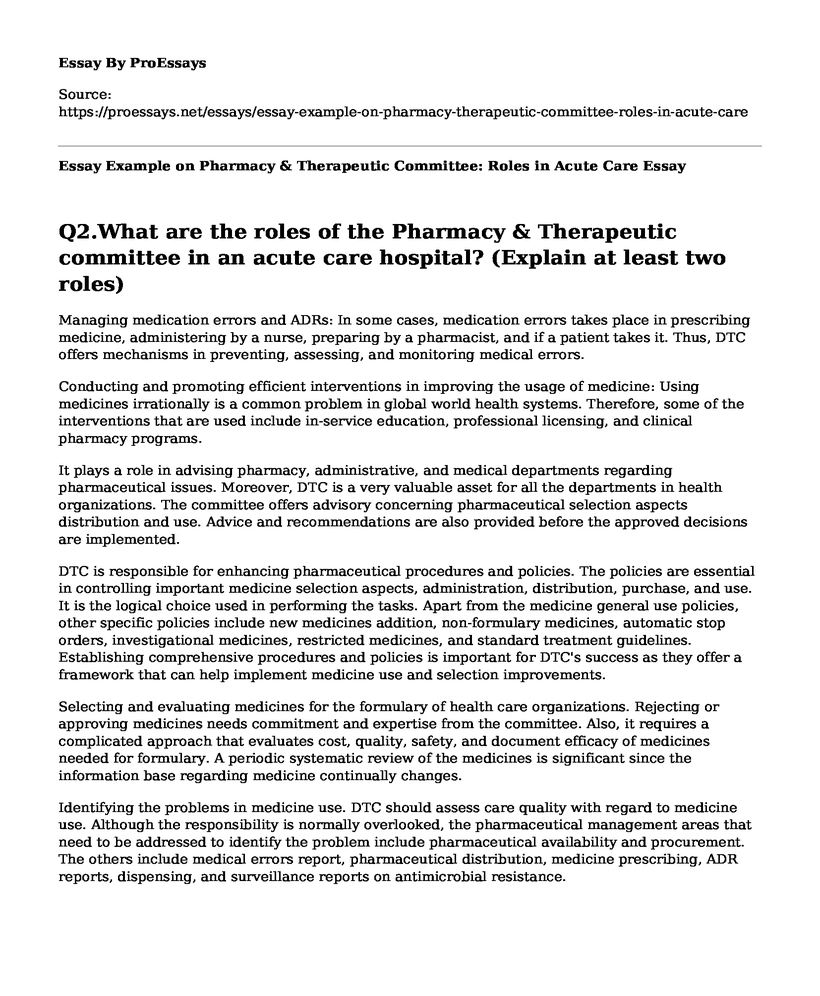Q2.What are the roles of the Pharmacy & Therapeutic committee in an acute care hospital? (Explain at least two roles)
Managing medication errors and ADRs: In some cases, medication errors takes place in prescribing medicine, administering by a nurse, preparing by a pharmacist, and if a patient takes it. Thus, DTC offers mechanisms in preventing, assessing, and monitoring medical errors.
Conducting and promoting efficient interventions in improving the usage of medicine: Using medicines irrationally is a common problem in global world health systems. Therefore, some of the interventions that are used include in-service education, professional licensing, and clinical pharmacy programs.
It plays a role in advising pharmacy, administrative, and medical departments regarding pharmaceutical issues. Moreover, DTC is a very valuable asset for all the departments in health organizations. The committee offers advisory concerning pharmaceutical selection aspects distribution and use. Advice and recommendations are also provided before the approved decisions are implemented.
DTC is responsible for enhancing pharmaceutical procedures and policies. The policies are essential in controlling important medicine selection aspects, administration, distribution, purchase, and use. It is the logical choice used in performing the tasks. Apart from the medicine general use policies, other specific policies include new medicines addition, non-formulary medicines, automatic stop orders, investigational medicines, restricted medicines, and standard treatment guidelines. Establishing comprehensive procedures and policies is important for DTC's success as they offer a framework that can help implement medicine use and selection improvements.
Selecting and evaluating medicines for the formulary of health care organizations. Rejecting or approving medicines needs commitment and expertise from the committee. Also, it requires a complicated approach that evaluates cost, quality, safety, and document efficacy of medicines needed for formulary. A periodic systematic review of the medicines is significant since the information base regarding medicine continually changes.
Identifying the problems in medicine use. DTC should assess care quality with regard to medicine use. Although the responsibility is normally overlooked, the pharmaceutical management areas that need to be addressed to identify the problem include pharmaceutical availability and procurement. The others include medical errors report, pharmaceutical distribution, medicine prescribing, ADR reports, dispensing, and surveillance reports on antimicrobial resistance.
Q3. Name the Rescue Drug for insulin Regular overdose?
The Rescue Drug for Regular insulin overdose is Glucose tablet
Q4. Write TWO 2020 National Patient Safety Goals for Acute care Hospital concerning Medication Management By The Joint Commission
Labeling all medications that are not labeled before a procedure in supplies and medicine set up area.
Fully record and even pass the correct information regarding the medicines of a patient and compare them to the new ones, which are given to a patient. Also, a patient should be informed on the essence of bringing up to date list any time they visit a doctor.
Q5. Indicate TWO objectives of Antibiotic stewardship program in hospitals
The first objective is making changes in the sustainable behavior of physicians concerning practices of prescribing antibiotics. The main reason behind the objective is the emergence of antibiotic resistance.
The other object is evaluating economic benefits and outcomes of the high, medium, and low high resource usage of antibiotic stewardship in comparison to the baseline data. It also works towards expanding hospitals' information technology antibiotic usage system.
Q6. Write the Next Standardized Medication Administration schedule Time ( Inpatient Hospital) for: Q24h Ii the first dose is given at 6 AM upon hospital admission
The Next Standardized Medication Administration schedule Time for the patient in an inpatient hospital will be the next day at 6 AM because the medication is supposed to be given after every 24 hours.
Q7.Narrate ONE acceptable condition for a Nurse to Override ADM to access drug includes
One of the acceptable conditions that a nurse can override ADM access to the drug is in a time-sensitive emergency, which does not give room for the review of a pharmacist. It means that a delay that results from the verification of a pharmacy can highly compromise the clinical status of a patient then override is highly acceptable.
Q8.Write ONE Drug product which should NOT be crushed and Narrate the Reason?
Drug Name: Actonel
Reason: The main reason is that the drug is irritant, thus, chewing, crushing, or sucking can result in oropharyngeal irritation to an individual.
Q9. Name ONE High Alert Medication
One of the medications that are on high alert is Lidocaine medication.
Q10. What is the Air quality classification (ISO) for the Non-HD Anteroom?
The Air quality classification (ISO) for Non-HD Anteroom is ISO 7 or 8, depending on the level of risk of sterile products, which are being prepared in the vital room. There is unidirectional airflow in ISO 7 and 8. In ISO 8, there are 15 to 25 air changes in about 1 hour while in ISO 7, there are 30 to 60 changes in one hour.
Cite this page
Essay Example on Pharmacy & Therapeutic Committee: Roles in Acute Care. (2023, Apr 24). Retrieved from https://proessays.net/essays/essay-example-on-pharmacy-therapeutic-committee-roles-in-acute-care
If you are the original author of this essay and no longer wish to have it published on the ProEssays website, please click below to request its removal:
- Healthcare Paper Example: Project in Organization Leadership
- Research Paper on Vaccines
- Fetal Abortion Christian View Essay Example
- Water Pollution and Human Health - Article Analysis Essay
- COVID-19 in the US: NY at the Epicenter of Pandemic - Essay Sample
- Paper Sample on Clinical Health Act/HIT: Revolutionizing EMR/Privacy Protection
- Free Essay Sample on Keys to Nursing Leadership







